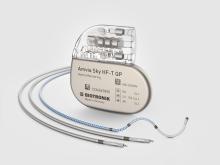Key Results
- 1 minute median insertion time until removal of the insertion tool
- 0.73 mV mean R-wave amplitude
- >99% noise-free sensing
- 95.1% visible P-waves in all heart cycles in Sinus Rhythm ECGs
- ≈94% Home Monitoring transmission success rate
- 0.9% serious adverse device-related events; 0 pocket infection requiring invasive intervention
- 97.1% excellent or good wearing comfort perceived by patients
